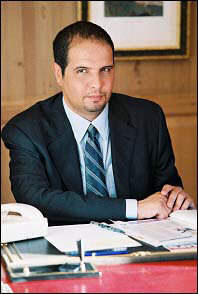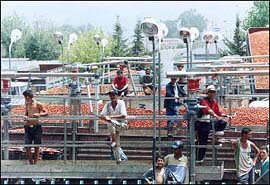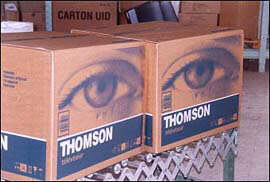 PRIVATE SECTOR PRIVATE SECTOR |
 Driving Force of the Algerian Economy Driving Force of the Algerian Economy |
The Algerian private sector still remains unknown in spite of its important contribution in the local economy. This untrue vision of the sector is mainly due to the prevailing trade relations , decades along, between foreign economic agents and Algerian public companies. However, and since 1998 , the private sector has clearly outpaced the public sector and actively contributes in the change of attitudes within the framework of the professionalization of the economy. The sector presently represents 60% of the added value , off hydrocarbons, and exploits more labor force than the public sector does. It is considered as the main motive for any economic or social development. In fact , the private sector is deeply taking root and clearly shows that any Algerian economic stimulation shall necessarily go through its restructuring. Considering the virginity of the Algerian market, lots of business opportunities are offered and projects swell increasingly.

 Employers' Opinions and Views Employers' Opinions and Views |
Beyond all doubt, the private sector has now become the main contact for the government and is organized around employers ( body of managers) through which the sector expresses its vision concerning the economic reforms. Many organizations of managers came to existence among which, the FCE, CIPA, CGEOA, and the association SEVE which is an organization of female managers and the latest one for young managers. The body of managers sits at the Council of Money , Algerian Central Bank Credit and at the ANDI beginning of this year.
One of the most known and active organizations is the Forum Of Managers with 83 members, mostly industrialists, for a global turnover of 220 billion Algerian Dinars. Explaining its utility, Mr. Omar Ramdane, President of the Forum, says that: " The aim of this forum is to create a flexible and easy organization where companies can have the possibility to debate and analyze the economic issues of the country and submit thus solutions accordingly to the public authorities while taking decisions. In addition, we also want to develop certain services for the benefit of the companies". The main role of the forum is thus to attract the public authorities attention by contributions and concrete suggestions in order to speed up any implemented action. In fact the forum wants to be consulted by the authorities i.e. the government, and be part of the major decisions taking notably those related to the contract of association with the European union and the preparation to the WTO membership.
One of these major stakes is undoubtedly the suppression of the customs barriers which is considered as a threat by the body of managers The latter request a deadline necessary to well prepare the issue. Indeed, in periods of crisis , where the offer is weak without real demanding consumers, some companies had obtained exceptional import licenses . The Algerian companies often encounter difficulties to adapt to the new environment of the free market. This is essentially due to the previous system and the customs rate in force within the trade protectionism prevailing in the past.
 The Boom of the Private Sector The Boom of the Private Sector |

The emergence of the Algerian private sector is relatively recent. With a strong financial basis created in the 60's and the 70's, financed by the oil incomes , the external debts and the monetary creation; that was the period of the providential state. It is only in 1982, that the government decided to grant the private sector a complementary role to the public sector in associated activities to transformation and distribution.
Nevertheless, the private sector is not allowed to invest more than 35 million French Francs.
In 1993, all the activities have been opened to the private sector without any investment limit. This new freedom coincides however with an unprecedented liquid assets crisis. It is in 1995 that the sector could get all the necessary instruments essential to the management of its companies and its development.
The symbol of the Algerian private sector success is undoubtedly El Khalifa Group which in few years only has achieved a significant expansion. Its secretary general Mr Rachid Amrouche , sums up the positioning and the ambitions of the group as follow: " In terms of strategy, we follow a policy of internal growth. Thereby, with the process of the Algerian economy liberalization which encourages the private initiative, we started by constituting and extending our commercial network in order to cover and reach all the different fringes of society and even establish our position and hold important market shares. This process is being deepened and has recently been comforted by an external policy of growth which enabled us to buy out a number of companies like the airline company Antinea Airlines in Algeria, the Erste Rosenheimer Privatbank in Germany and recently the Philip Holzmann International in Germany too" .

Thanks to this policy and strategy of expansion , the group succeeded in establishing its position in the national market. Indeed, regarding the trade agreements Algeria is willing to take , the group expects to have a primordial role in the implementation of the said agreements.
Apart from the remarkable success of Khalifa Group, many other businessmen, with their dynamism and will of change, actively participate in the stimulation of both their companies and the country economy. This is illustrated by the New Algerian Cannery (NCA) in the agribusiness sector. The company essentially ensures the conditioning and the sale of fruits and vegetables. Being the General Manager of this family company, Mr. Slim Othmani highly speaks of the new reforms undertaken by the country authorities: " The impact of the liberal reforms is considerably positive since it enabled us to diversify our sources of provisioning and even stimulate the competition (…) i.e. the growth rate". Always optimistic and self confident about the huge potential of the Algerian youth, Mr. Othmani notices a significant evolution in the corporate attitudes: " There's an obvious change of the cultural attitude in the perception of the production tool; this change is not only concentrated at the managerial level but also extended to all the company workers".
| Mr. Othmani also raises the Government will to encourage agriculture and expects Algeria to have a production overrun in a short-run. " There should be an action of approximation between the sectors of agriculture and agribusiness in order that farmers understand what kind of products we are able to transform and use in the agribusiness industry".
The clear evolution of the agribusiness sector is also well illustrated by El Bousten Group, the biggest tomato canning industry in Algeria with 35% of the market shares. Beyond its economic success , the particular characteristic of the company is its direct commitment in agriculture by introducing new techniques to the sector such as chemical fertilizers. This is a way to teach farmers, who are often limited to the basic agriculture, a new economic notion of the business. Mr. Boudiaf, CEO of El Bousten Group, says that: " before the creation of the company in 1992, the Algerian tomato imports were about 25 000 to 30 000 tons/ year, but now our company produces an excess of production of 20 000 tons meant for exportation".
 Partnerships and Export Perspectives Partnerships and Export Perspectives |

Still in the agribusiness sector, the case of Mehri group is highly illustrative. Holding a franchise for the distribution of Pepsi-Cola all over the Algerian territory , the group reinforces even more the dynamic spirit of the private sector. Mr Djamel Mehri General Manager of Pepsi-Cola, well acquainted with the Algerian market , gladly shares his experience by saying: " Algeria is what Egypt used to be in the 80's" , referring thus to the economic boom in progress in the country. Besides the partnership agreement with Pepsi-cola, the company is tied down to Stella Artois for the production of the beer Tango and to Savola for oil manufacturing. The group is also willing to extend its activities to the hotel business. Another sector highly appraised by private investors is that of electronics. Indeed, the sector notices a remarkable growth. In this context, Mr Ait Yala General Manager of BYA Electronics , justifies this success mainly by the presence of a highly qualified and cheap labor force in Algeria as well as a reasonable energy cost price.
The thing now is to be able to develop electronic products at low prices. Strong with their successful collaboration with Thompson Group , the executive staff of BYA Electronics insist on the reciprocal advantages offered by this association: " We have a know-how and an acknowledged on- field experience. Beside, we have managers of an international level . Thereby, we believe that we are ready to consider any partnership proposal which would enable us to enhance our activity and go forward".
According to Samy Boukaïla, vice-président of BKL, a company specialised in the manufacturing of PVC frames, diversifying the investments is a recurrent topic. Being already active in the field of construction through a joint venture with a canadian comapny , BKL looks forward for going farther. Indeed, Mr Boukaila (BKL) envisions his company as:" a holding with different active affiliates in different economic sectors mainly in construction, telecommunications and distribution". The issue is undoubtedly possible due to the virginity of the market. This diversification of the activities could be interpreted by the company resolution to firmly establish its position in the country and its will to conquer new external markets. Despite their presence in Russia, the Middle East, Iraq and Libya, the company longs for concretely showing its know how to western countries.
 The Dynamism of the SME & SMME (small and medium sized enterprises & small and medium sized manufacturing enterprises) The Dynamism of the SME & SMME (small and medium sized enterprises & small and medium sized manufacturing enterprises) |
The new corporate spirit does not only exist in the major companies but it is also noticed in the SME's and SMME's which progressively proliferate all over the country. With its 362 members , the CEIMI, Organization of the Entrepreneurs of the Mitidja Region (center of the country) works in close collaboration with the ministry of Industry ,Trade, and finances and many other associations , foreign as well in order to establish profitable mergers between businessmen. This organization is the spokesman of one of the most important regions of the country due to notably its wide network of SME's and SMME's .The organization main tasks is to establish contacts and ensure the promotion of these companies. " (…) The CEIMI performs a policy of collaboration and a multidimensional & multidirectional planing aiming at directly and concretely involve the companies and the industrialists , that we represent, in all what is related to the economic development of the region", asserts Mr Zitoune , Secretatry General of CEIMI.
The same action is found in almost all the Algerian SME's and SMME's among which the Simap. Indeed, specialized in the school requisites manufacturing, the company turnover has incredibly increased since the last ten years. These good figures enabled the company to be part of an upgrading program implemented by the ministry of industry in collaboration with the UNDP. Holding more than 50% of the market shares , Mme Belbachir , CEO of Simap, is proud of the company achievements. Yet, the priority is not to get external market shares but she keeps the possibility of a probable partnership: " I'd rather look for a partner who has the necessary know-how and a total and perfect mastery of the production tool management. (…) It is only then, that we would envision the conquest of external market shares within a long run, and in the same way firmly establish our presence in the local market".
Many consider the emergence of the Algerian private sector as the only issue for a real and durable modernization and development of the country economy. However, in order to well establish the sector, a lot of incoherent things have to be reviewed such as the heavy administrative constraints. Indeed, the figures of the sector are still fragile and in order to boost more this sector, investors should maintain their efforts and their policy of investment and modernization .These companies should be supported by a legal and promptly effective framework.
In spite of some setbacks, and in fifteen years of liberalization the Algerian economy has been appreciably enhanced. The thing now is to carry on implementing the program of reforms by giving a great deal of importance to the development of the private sector. In fact , the major challenge now is to be able to reach a high growth rate which would help in bringing down the unemployment rate. To do so, there must be a macro-economic stability, gather the necessary financial resources ; but the most essential of all this , is to confirm the micro-economic reforms intended to companies. These measures should develop the efficiency and competitiveness of the companies, fight the systematic recourse to imports by stimulating the national offer and promote the manufactured products for the exportation. |

